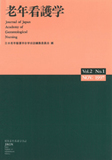Japanese
English
- 販売していません
- Abstract 文献概要
- 参考文献 Reference
House-boundにある在宅要介護高齢者の自立支援対策を検討するために,1年半のADL自立度の変化およびADL各動作項目の自立度の変化について検討を行った.その結果,
1.House-boundにある高齢者のADLの変化は,第2次調査では対象者の43.5%,第3次調査では対象者の50.0%が,第1次調査より身体的自立度の上昇を示した.
2.House-boundにある高齢者のADLの各動作項目における1年半の変化では,失禁状態を評価する「排尿コントロール」,「排便コントロール」,ならびに,「ベッド・椅子・車椅子の移乗」,「歩行・車椅子による平面移動」の動作が最も変化しやすい項目であった.
以上により,house-boundにある要介護高齢者は,ADL上昇の可能性を十分保有する対象群であり,排泄機能,移動能力保持へのより強力な自立支援対策が必要であると考える.
It is important to maintain independent life for house-bound home care elderly.
We followed up 58 house-bound home care elderly persons to clarify the change of the severity in their disability with FIM (Functional Independence Measure) for 18 months.
Futhermore, the change of their each performance level in the activity of daily living (ADL) were examined with FIM.
1. At the second survey, 43.5% in the 46 house-bound home care elderly could improve their disability for 5 months. At the third survey, 50.0% in the 32 house-bound home care elderly could improve their disability for 18 months.
2. Among the each performances of the ADL with FIM in the 32 house-bound home care elderly, sphincter control; urinary bladder management and bowel management items, mobility on bed, chair or wheelchair and locomotion with walk or wheelchair changed the most remarkable for 18 months.
Based on these findings, house-bound home care elderly are aged people who hold the potential ability to improve their disability. To support their independent life ,it is the most important to maintain ability of sphincter control as well as locomortion.
Copyright © 1997, Japan Academy of Gerontological Nursing All rights reserved.


